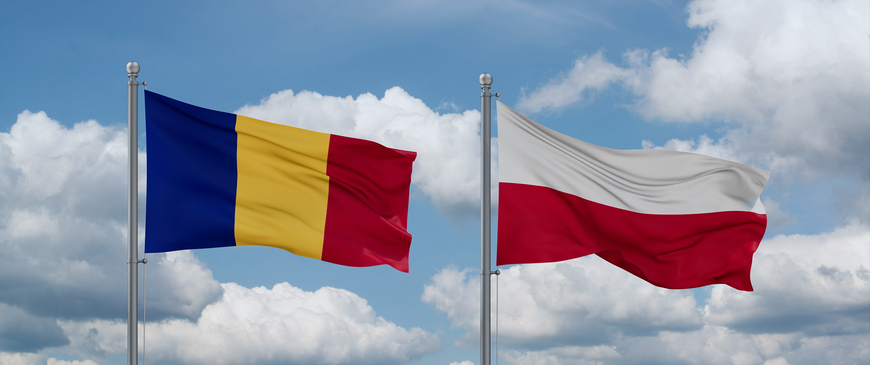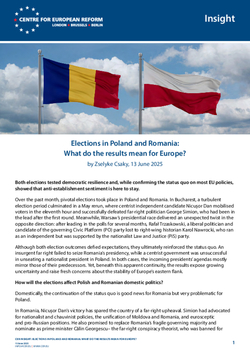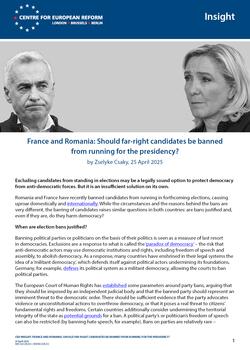
Elections in Poland and Romania: What do the results mean for Europe?
Both elections tested democratic resilience and, while confirming the status quo on most EU policies, showed that anti-establishment sentiment is here to stay.
Over the past month, pivotal elections took place in Poland and Romania. In Bucharest, a turbulent election period culminated in a May rerun, where centrist independent candidate Nicușor Dan mobilised voters in the eleventh hour and successfully defeated far-right politician George Simion, who had been in the lead after the first round. Meanwhile, Warsaw’s presidential race delivered an unexpected twist in the opposite direction: after leading in the polls for several months, Rafał Trzaskowski, a liberal politician and candidate of the governing Civic Platform (PO) party lost to right-wing historian Karol Nawrocki, who ran as an independent but was supported by the nationalist Law and Justice (PiS) party.
Although both election outcomes defied expectations, they ultimately reinforced the status quo. An insurgent far right failed to seize Romania’s presidency, while a centrist government was unsuccessful in unseating a nationalist president in Poland. In both cases, the incoming presidents’ agendas mostly mirror those of their predecessors. Yet, beneath this apparent continuity, the results expose growing uncertainty and raise fresh concerns about the stability of Europe’s eastern flank.
An insurgent far right failed to seize Romania’s presidency, while a centrist government was unsuccessful in unseating a nationalist president in Poland.
How will the elections affect Polish and Romanian domestic politics?
Domestically, the continuation of the status quo is good news for Romania but very problematic for Poland.
In Romania, Nicușor Dan’s victory has spared the country of a far-right upheaval. Simion had advocated for nationalist and chauvinist policies, the unification of Moldova and Romania, and eurosceptic and pro-Russian positions. He also promised to replace Romania’s fragile governing majority and nominate as prime minister Călin Georgescu– the far-right conspiracy theorist, who was banned for voter manipulation after the first round in December 2024 and who currently faces criminal charges on six counts. Chances of a Simion victory spooked investors, signalling a currency crisis and long-term economic damage.
While Nicușor Dan also promised a “fundamental transformation”, including moving away from what traditional establishment parties represent and tackling the problem of corruption in Romania, his policies are much more pragmatic. His firm pro-EU and pro-NATO stances, respect for the rule of law and strong emphasis on fiscal discipline are positive signs for the future – even if Romania is facing a rocky period with one of the EU’s highest budget deficits and rising public debt. The Romanian government, led by a coalition of mainstream parties, fell before the second round of the election, and Dan is hoping to facilitate the creation of a pro-EU government that aligns with his policies, including on reducing the fiscal deficit.
The situation calls for far less optimism in Poland. As we wrote previously, winning the presidency was crucial for the government to pass deadlocked reforms and restore the rule of law. The European Commission unfroze Poland’s EU funds based on the new government’s reform plans. After Nawrocki’s victory, those reforms will be on ice until at least the 2027 parliamentary elections because he is just as likely as Duda, if not more, to block them. In fact, in his election programme, Nawrocki accused the current government of violating the rule of law. His victory means that the judicial institutions captured by PiS – the Constitutional Tribunal and the National Council of the Judiciary (NCJ), the body responsible for judicial appointments – will remain compromised, failing to operate as independent and impartial bodies. Likewise, the status of the so-called neo-judges – judges that make up one-third of Poland’s judiciary and that were appointed by the PiS-controlled NCJ in a tainted process – will remain unclear. And there will be a stalemate in new judicial appointments as well as in nominating new ambassadors.
The election outcome has had repercussions for the stability of the coalition government. While it survived a no-confidence vote on June 11, the continuation of the difficult cohabitation with the president will weaken Prime Minister Donald Tusk’s hand and make it more difficult to reconcile the diverging priorities of his coalition partners. Although Nawrocki was elected as an independent, his lack of political experience leaves him reliant on the agenda of PiS party leader Jarosław Kaczyński, who brought him out of relative obscurity. This means that Nawrocki will likely use wedge issues, such as abortion or immigration, to sabotage the current government and to rally support for PiS ahead of the next election in 2027.
What do the elections mean for the two countries’ roles in the EU?
When it comes to the relationship with the EU and its institutions, the two elections will deliver little change, for now.
The stakes were much higher in Romania’s vote – not only because the far-right contender, Simion, represented more extreme policies compared with the conservative Nawrocki, but also because Romania is a semi-presidential system. The presidentnominates and appoints the prime minister, serves as commander-in-chief of the armed forces, concludes international treaties and represents the country at the European Council (EUCO). The moderate Nicușor Dan will therefore be Romania’s “face” in Europe and will represent a significant degree of continuity with his predecessor, Klaus Iohannis.
When it comes to the relationship with the EU and its institutions, the two elections will deliver little change, for now.
In Poland, the president’s prerogatives are more limited, and include initiating and vetoing legislation, acting as commander-in-chief of the armed forces, and having some narrowly defined foreign policy competences. As such, Nawrocki’s victory will make less of a difference at the level of EU institutions – especially because the country will still be represented by centrist Prime Minister Donald Tusk at EUCO meetings in Brussels. What matters, however, is that Tusk will lead a significantly weakened coalition government. This, along with Nawrocki’s EU-sceptic policies, will limit Poland’s influence just as the country has returned to the EU’s top table. Nawrocki’s hostility to the Franco-German axis could hinder closer co-operation, including participation in important regional alliances such as the Weimar Triangle, composed of Germany, France and Poland – especially as he already favoured the Visegrad Four, an alliance between Poland, Hungary, Slovakia and the Czech Republic during the campaign.
In several policy areas, the impact of the elections will be felt more acutely.
On defence and when it comes to supporting Ukraine, both countries play an outsize role. Romania is set to host NATO’s largest base in the near future, and Poland is the EU’s biggest military spender as a share of GDP (estimated to reach 4.7 per cent in 2025). While Nicușor Dan lacks significant foreign policy experience, he supports the development of robust EU defence architecture. Shortly after his election, Dan participated in the Bucharest Nine (B9) summit in Vilnius in early June, met with President Volodymyr Zelenskyy and reaffirmed Romania’s support to Ukraine.
Nawrocki, on the other hand, gave his first foreign interview to a Hungarian pro-government outlet, and said that – while agreeing with supporting Ukraine from both a “strategic and a geopolitical perspective” – he opposes Ukraine’s EU accession. The new president referenced historical disagreements between the two countries and mentioned farmers’ frustrations over “unfair competition”. Earlier, Nawrocki signed a pledge opposing Ukraine’s NATO integration and was against the development of EU defence capabilities outside NATO. Given that it is Tusk who represents Poland in the EU, but it is Nawrocki who participates in NATO summits, the new president’s stances foreshadow a conflictual cohabitation and confusion over Poland’s foreign policy.
On green policies and on migration, the positions of the Romanian and the Polish presidents also diverge. Nawrocki opposes the Green Deal, emphasising his support for Poland’s farmers, while Nicușor Dan will likely broadly back the EU’s climate agenda given his previous support for sustainable and environment-friendly policies as mayor of Bucharest in the past.
Romania has not opposed the Migration and Asylum Pact. Poland’s Nawrocki, however, has denounced the agreement, portraying himself as the defender of Polish interests and sovereignty. His position, although more hard-line, is in line with that of the government, which has already been moving to the right on migration. Tusk earlier announced the temporary suspension of asylum on the border with Belarus and said that Poland will refuse to take in additional migrants or refugees under the Pact.
On questions of EU institutional reform, the two new presidents are expected to follow the positions of their predecessors. Poland has long been sceptical of getting rid of national vetoes and replacing unanimity with qualified majority voting (QMV). Tusk’s foreign minister has expressed openness to change, but the coalition has been divided on the issue and Nawrocki is very much in favour of protecting national competencies. Romania, on the other hand, joined the so-called Friends of QMV group in 2023 and supports reforming EU decision-making – with Nicușor Dan unlikely to change that position.
Altogether then, the Polish and Romanian elections will not result in immediate changes to the status quo. Romania will continue to go with the pro-EU mainstream on the most important policy issues and will remain a steadfast NATO ally. Poland, despite its return to the EU fold, will continue to be hamstrung by a eurosceptic president, confusion over foreign policy and a domestic political situation that forces the government to tack right.
What do the elections say about the state of democracy?
The elections also served as a test of democratic resilience and revealed cracks in the system.
Romania’s problems were particularly stark, as allegations of voter manipulation, foreign interference and democratic destabilisation led to the cancellation of the first round of the vote and a ban on two candidates from the race – a controversial move by the country’s Constitutional Court. Although the far-right was ultimately defeated in the rerun, Simion still secured 46 per cent of the vote and his far-right AUR party continues to lead the polls, well ahead of established political parties. The durability of Dan’s momentum is uncertain; his predecessor, Iohannis, also promised to usher in a new era of reform and renewal, only to leave as one of the most unpopular presidents in Romania’s history at the end of his second term.
In Poland, the election featured some disinformation and entrenched political polarisation, yet fundamental freedoms were respected according to the assessment of the OSCE’s Office for Democratic Institutions and Human Rights (ODIHR). At the same time, two far-right candidates, Slawomir Mentzen and Grzegorz Braun, received a total of 21 per cent of the vote in the first round and most of those votes went to Nawrocki in the second round.
In both cases, turnout was record high and the results very close, underscoring that anti-establishment sentiment is here to stay. In fact, Romania’s Dan himself benefitted from being seen as an anti-establishment candidate. The governing coalition’s defeat in Poland additionally demonstrated that voters expect results – irrespective of who is to blame for a lack of progress. They also showed that tacking further right is not a viable strategy for the mainstream since, as Jean-Marie Le Pen famously said, “Voters always prefer the original to the copy”. The far-right’s unexpectedly strong showing, along with Trzaskowski’s defeat, proved just that.
In both cases, turnout was record high and the results very close, underscoring that anti-establishment sentiment is here to stay.
Post-election take-aways for the EU
The EU also has a couple of lessons to learn from the two elections.
First, the European Democracy Shield – a Commission initiative intended to combat threats and connect the dots on defending democracy – cannot come soon enough, and it should not disregard the thorny question of domestic support for anti-democratic forces.
Second, the European Commission’s decision to unfreeze all funds to Poland before its rule of law reforms were passed – and the lack of a follow-up monitoring for those reforms – may have been a mistake. ‘Intent’ is not a good enough legal basis and the Commission could be in hot water if the situation deteriorates or if PiS returns to power.
Third, populist troublemakers are here to stay and the question of troublemaker-proofing EU decision-making will continue to be on the agenda. The EU dodged a bullet with Nicușor Dan’s victory in Romania and, given Nawrocki’s limited foreign policy competencies he will have little direct impact on EU decision-making. But Hungary’s Viktor Orbán is not alone in obstructing joint EU action: recent veto threats by Slovakia’s Robert Fico on Russia sanctions and an upcoming election in the Czech Republic, where populist former prime minister Andrej Babiš is leading in the polls, are adding to the headache in Brussels. Voting reform and the expansion of QMV are unavoidable questions for the future.
And finally, the increased support for populist and sovereigntist positions is bad news for an EU where more and more areas need close co-operation. They also raise a disconcerting question at the national level: can democracy survive if it is continuously on the ballot?
Zselyke Csaky is a senior research fellow at the Centre for European Reform.



Add new comment